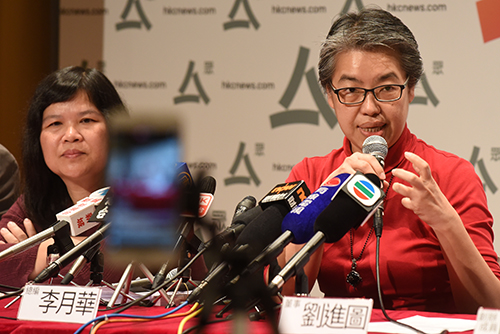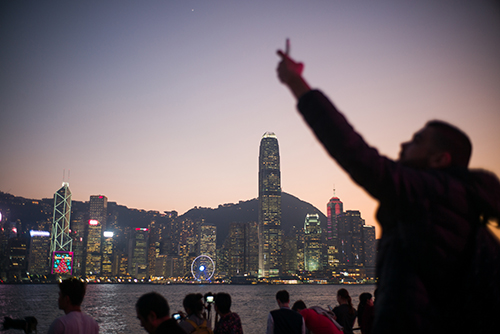A new Chinese-language website pledging to provide Hong Kong with “independent, accurate and fair” news is the latest journalism venture to open in the city, in an attempt to counter increasing Chinese control of the media. Citizen News was launched January 1 by a group of journalists, including Kevin Lau Chun-to and Daisy Li Yuet-wah, who say they plan to cover a wide range of issues and views across the political spectrum.
The idea of Citizen News was developed in 2014 when Lau was recovering from an attack in which an unknown man slashed the former editor-in-chief of the Chinese-language daily Ming Pao with a meat cleaver six times in his back and leg, Lau said at the January 1 news conference. It is unclear whether the attack was linked to Lau’s journalism, but in an interview with The New York Times Lau said he could not think of any other reason for it.
CPJ has documented a decline in press freedom in Hong Kong in recent years, as the Chinese government increases its influence over the city’s traditional media, particularly through pro-Beijing business interests taking ownership of newspapers. The attack on Lau has come to symbolize the extent to which the situation has deteriorated. A group of news websites has emerged to counter the tide of this restrictive environment, but the journalists behind them face the risk of being detained when travelling to the mainland, financial uncertainty, problems with access, and cyberattacks.
An example of the pressures faced is illustrated by the case of Tony Tsoi Tong-hoo, the co-founder of House News, who unexpectedly closed the news website in July 2014. Shortly after the closure, news outlets reported that Tsoi, who was also chief executive officer of a Hong Kong electronics manufacturer, had gone missing for several days earlier in the month. In a note released to the public explaining the closure, Tsoi said that he was “haunted with fear” every time he crossed the border between Hong Kong and the mainland.
A person familiar with Tsoi’s case, who asked to remain anonymous because of security concerns, told CPJ that Chinese state security agents detained Tsoi during a business trip to Heyuan city in Guangdong province in early July 2014. The person said that during the detention, Chinese authorities pressured Tsoi to publicly denounce Occupy Central, a pro-democracy movement he had vocally supported. His outlet had covered Hong Kong’s annual pro-democracy march on July 1 and an overnight sit-in in Central, Hong Kong’s business heart.
Tsoi was told he could face prosecution on the mainland for violating Chinese national security laws if he did not obey, the person said. After he returned to Hong Kong, agents allegedly connected to the Chinese government in Hong Kong again pressured Tsoi to publicly oppose the movement in a personal capacity and through news coverage, CPJ was told. Tsoi refused to comply and instead closed the website.
Tsoi did not respond to CPJ’s emailed requests for comment. CPJ was unable to find working contact details for the Ministry of State Security.
Despite the apparent pressure, in December 2014 Tsoi resigned from his position at the electronics company and founded Stand News with two editors from his previous outlet. “House News died, Stand News is born. In Hong Kong in 2014, we have a responsibility,” a statement on its website said. To better resist external pressure and maintain independence, Stand News abandoned the for-profit model of House News and operates as a trust financed by public donations, according to the Chinese-language website.

The nonprofit model is also being used by Citizen News. Li, a former editor with Apple Daily, told CPJ the website is exploring new operation models such as crowdfunding. The website also offers grants to journalists covering issues that are often ignored by the city’s mainstream media. In recent years, Hong Kong news outlets have faced pressure to not cover issues such as the wealth of political elites, human rights issues and the Tiananmen Square massacre.
“If we can succeed, we bring hope to the young journalists: if we old people can, the young people definitely can,” said Li, who CPJ honored with its 1994 International Press Freedom Award.
Crowdfunding is also used by the English-language news website Hong Kong Free Press, which was founded in 2015. Its editor-in-chief, Tom Grundy, told CPJ that funding was a concern, but that he has become less worried as the website matured. “If we do good work, I think our readers will support us each year,” Grundy said. The site’s crowdfunding campaign last year resulted in it being fully funded for 2017, according to its end-of-year statement.
Grundy said the biggest problem for Hong Kong Free Press is a ban on journalists from digital-only news outlets accessing government press conferences and press releases.
An officer at the Hong Kong government in December told CPJ that it was reviewing the possibility of admitting online media, but yesterday a government official said the ban is still in place, and cited the lack of a clear definition for “online media” as a reason for it being imposed.
Digital journalists also face the risk of digital and physical attacks. Oiwan Lam, co-founder of Inmedia, a Chinese-language news portal, told CPJ her website has been “a constant target of DDoS attack.” And, in 2012, attackers broke into Inmedia‘s office and smashed the computers. The attackers were arrested, but police did not find out who had ordered the raid, Lam said.
Li said Citizen News’ founders were not overly concerned about the threat of attack or pressure. “We do what we need to do. The corrosion of press freedom starts not necessarily from pressure from power, but from news organizations choosing to self-censor,” she said.
Lokman Tsui, assistant professor at the School of Journalism and Communication at Chinese University of Hong Kong, said there was a spirit “to fight to make sure Hong Kong stays free” among journalists in the city. “I think it is healthy that there are all these efforts to experiment with media. That’s a good sign,” said Tsui. Yuen Chan, a senior lecturer at the school, said the spirit is echoed by the rest of society, “Everybody is trying a lot of things. It is too early to say what will work, what won’t, but for the time being, they managed to generate a lot of good will,” she said.
Evan Fowler, co-director of Hong Kong Free Press, told CPJ he will continue the endeavor to uphold independent journalism, saying, “The best we–those of us who love Hong Kong–can do is to keep honesty alive.”
